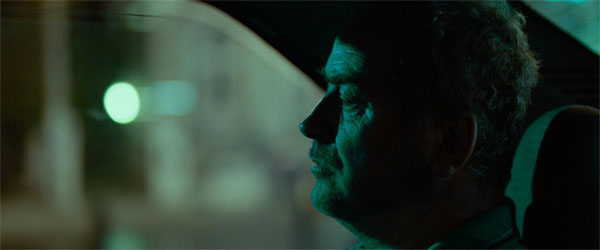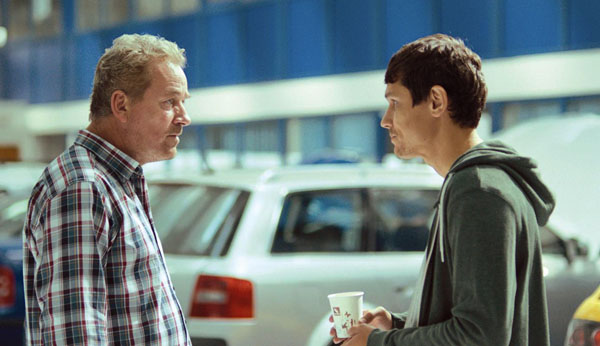“Radu Muntean’s One Floor Below, the latest entry in the Romanian New Wave, has a bone to pick with technology–and other hazily-drawn issues that may be difficult to suss out.” Blake Williams for Ioncinema: “Coming in five years after his festival circuit breakout hit, Tuesday, After Christmas, Muntean now veers toward the mystery genre by ostensibly reworking Alfred Hitchcock’s masterpiece Rear Window (1954) to accommodate Romanian middle-class life and 21st century perks and paranoias regarding Facebook status updates, motion-sensing video games, Fitbits, login passwords, and ominous neighbors. Fascinating and ultimately deeply mysterious, this is a film that presents seemingly illogical fragments from a murder case to thwart audience desires for procedural problem-solving, cruising along on an escalating sense of foreboding and cryptic ellipses.”
“Superficially, One Floor Below involves the life of Sandu [Teodor Corban] with his wife [Oxana Moravec] and son [Ionut Bora] and dog, in the days following the discovery of a young neighbor’s murder on the floor below his apartment,” explains Barbara Scharres. “Although Sandu overhears something the day of the murder that may be evidence against another neighbor, he mysteriously chooses not to inform the police when he’s questioned.”
Also at RogerEbert.com, Michał Oleszczyk argues that Sandu’s “reluctance to aid the police in the investigation is as clear a sign of his personal fear (he suspects he knows who the murderer is and he doesn’t want the guy to be after his family) as it is of his alienation from society at large, still marked by the aftermath of Ceauşescu’s morally draining regime…. I feared that the way of articulating the subject matter may be too offhand and subtle for it to fully register with audiences that haven’t grown up (as I have) within the former communist block. The key to appreciating One Floor Below is to keep in mind that it takes place in a country still troubled by its past—just like the son of the main character proves to be troubled by chaotic, video game-fueled dreams in the film’s last, strangely comforting scene that is as close as Muntean gets here to articulating something akin to hope.”
“There’s slow burn, and there’s wondering if the thing is even lit.” For Jordan Hoffman, writing for the Guardian, One Floor Below “is an exercise in frustration and disorientation…. So many of the great recent Romanian films like The Death of Mr. Lazarescu, Beyond the Hills, Everybody in Our Family, Child’s Pose work so well because of black humor, nonstop talking and an unbearable, increasing vice-grip. One Floor Below is a break from this formula.”
“Like a pot set to bubble only every few seconds, the drama is tightly measured to ensure a controlled level of tension that remains discreetly constant, nicely melding with Muntean’s skilled construction of three-dimensional bourgeois life,” writes Jay Weissberg for Variety. “Muntean and co-scripters Alexandru Baciu and Razvan Radulescu are never explicit about what Sandu is thinking (this wouldn’t be a Romanian film if they were): Is he protecting his family? Himself? An undercurrent of so much of new Romanian cinema has been the need to strip bare how people treat each other as fellow human beings, a theme that One Floor Below subtly examines not via the murder, but through Sandu’s lack of a sense of the common good: Keep your head down, don’t get involved—a message hardly limited to one Balkan nation.”
“The script plants hints about Patrascu’s motivations like a trail of tiny breadcrumbs, which make this something of thriller in its very low-key, hyper-realistic way, filmed with unfussy clarity by Tudor Lucaciu,” writes Leslie Felperin for the Hollywood Reporter. “A vast swathe of the running time is taken up with observing Patrascu going about his business as the DMV-like vehicle-registration center, interludes which almost become drolly amusing in their monotony. And then suddenly there’s a thunderbolt of violence, and all the masks of civility slip.”
“With a very precise method of framing, perfectly placing his actors in closed-in spaces, playing with the borders of the frame and off-camera devices, Radu Muntean scrutinizes the slightest inflections in the increasingly pensive and uncomfortable expression of his main character,” writes Fabien Lemercier at Cineuropa.
For Screen‘s Lee Marshall, “the most impressive thing about One Floor Below is the way it toys with our naïve faith in a narrative of justice and the myth of the conflicted man who must eventually do the right thing.”
Cannes has posted its interview with Muntean.
Updates: For Ignatiy Vishnevetsky at the AV Club, “unlike in his closely observed last feature, little here is rooted in recognizable psychology…. One Floor Below trades in technophobia and historically ingrained paranoia, but struggles to articulate itself past the point of the merely suggestive.”
At the Dissolve, Mike D’Angelo suggests that One Floor Below “has less in common with Muntean’s previous work than it does with Aurora, the three-hour anti-thriller made by his countryman, Cristi Puiu; both depict a series of mundane, even banal incidents (there’s a lot of registration minutiae in this movie) that accrue tension from an unnervingly static camera style and the audience’s constant awareness that violence could erupt at any moment.”
“When the film works, it’s due to a mix of the Hitchcockian suspense from having the murderer show up casually at lunchtime, and the ethnographic authenticity of depicting life in an apartment building,” writes Irina Trocan at Movie Mezzanine. But “as social commentary, the film is limited by its decision to stick with its purposefully conventional protagonist, preventing the potentially intriguing back-story from taking shape.”
“The humor and perspective of this story are so subtly wrought that one could almost declare them non-existent were it not for the clear glee Muntean has taken in giving Patrascu the most boring life imaginable,” writes Sophie Monks Kaufman at Little White Lies. “By minutely exaggerating the social realism, he makes the point that what people want to protect is not necessarily dramatic or glamorous. The hand that we’re dealt is all that we have.”
But Grantland‘s Wesley Morris has problems with “Sandu’s willing complicity. Maybe it can be written off as a peculiarity of the Romanian character. That doesn’t entirely excuse (or explain) the labored literariness of the final scene. And trying to put your finger on why this is damaging is like trying to find a hole in a tire in order to make a repair. It might just make more sense to buy a new one.”
Updates, 5/17: Notebook editor Daniel Kasman notes that “despite Ceaușescu and his era long gone from Romania, somehow a culture of spying, distrust, keeping secrets, and the skepticism of one’s own neighbors still can be brought to light through such a normal but nuanced occurrences and interactions as those between a building’s inhabitants, or a businessman and his clientele. The murder merely reveals this subtle, psychologically twisted underbelly.” And “yet One Floor Below is notably without the dourness or morbid, plodding detail of some of the more tedious films grouped under the description of the ‘Romanian New Wave.'”
For Tim Grierson, writing for Paste, as “with Tuesday, After Christmas, One Floor Below builds to an emotional catharsis that’s a doozy: intimate, intricate, gloriously messy, wonderfully staged. If this movie is merely a minor entry in the Romanian canon, it’s a testament to how spectacular a hot streak these likeminded filmmakers have been on.”
For RogerEbert.com, Michał Oleszczyk interviews Muntean and his co-writer, Alexandru Baciu.
Update, 5/20: “Muntean is great at domestic ambience,” writes Alex Ramon at PopMatters, “and at times One Floor Below suggests a variant on sundry ‘home invasion’ thrillers (including, of course, Rear Window), with the characteristics and tropes of such movies toyed with and subverted.”
Update, 5/22: “Evoking Hitchcock in its gripping sense of stretched temporality and simmering menace, the film contemplates how small escalations in aggression lead to life-long patterns of indecision,” writes Glenn Heath Jr. for the L. “Ambiguity eventually morphs into panic, as both Patrascu and Vali attempt to navigate their tenuous new relationship now founded on mutual cowardice.”
Updates, 5/23: “Corban is scruffy yet warm in the role of Sandu, whose commitment to avoiding confrontation eventually prompts an unexpected, climatic confrontation of pleasingly naturalistic fisticuffs,” writes Jordan Cronk for Reverse Shot. “But as with much of the film, more is suggested outside of the frame than in what’s shown on screen. It’s a credit to Muntean’s skills that he’s continued to sculpt his films down their most essential aesthetic elements while his thematic interests have only intensified.”
For Jessica Kiang at the Playlist, “lacking Porumboiu’s skewed black humor (the film is spectacularly dour), or Mungiu’s humanism, the result is a movie that pushes the New Wave experiment to the limit of bearability, and then goes right past it.”
Update, 7/12: For Giovanni Marchini Camia at the Film Stage, “One Floor Below is unevenly evocative in its resolute minimalism, proving only intermittently successful at engaging the viewer with the philosophical concerns at its core.”
Cannes 2015 Index. For news and tips throughout the day every day, follow @KeyframeDaily. Get Keyframe Daily in your inbox by signing in at fandor.com/daily.





